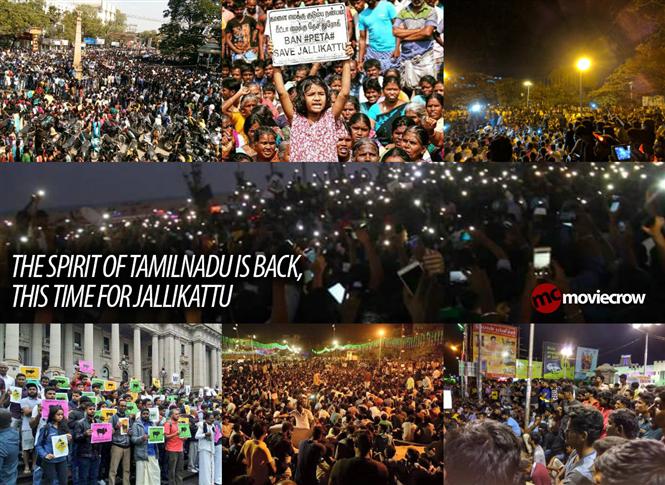The spirit of Tamilnadu is back, this time for Jallikattu
As the state steps into day 3 of an ongoing protest against the ban on Jallikattu, one cannot help but notice the nature of these protests. Not only have these crowds been calm and non-violent, but there has so far not been a single case of a ruckus or a destruction of property or chaos amongst the people gathered. It is to be noted here that some of these protests notably the one in Marina beach, Chennai has been active for its second consecutive day with people staying put over-night without proper access to food or water. Such a spirit of unity was last shown during the Chennai floods and in 2016 during the untimely demise of the state's then Chief Minister, Ms.J. Jayalalitha. So all this for a bull-taming sport? one may ask. Well, not quite so.
What is Jallikattu and Why exactly is it needed?
For a majority of the population (with non-rural background) Jallikattu continues to be a term remaining synonymous with a banned bull sport or a particular festival. However there is much more to it than what meets the eye. As Raja Marthandan who is a B.E., MBA graduate and has been into organic farming and indigenous cattle conservation for quite some years, puts it:
- Jallikattu is the reason for survival of the species of the cattle breeds, which are by nature ferocious and agressive.
- Majority of the breeds in Tamilnadu are used mainly for 3 reasons - farming, draught purposes and bio-cultural sports. With farming and draught usage already reduced to a maximum extent, banning of bio-cultural sports like Jallikattu could only lead to the extinction of these breeds.
- Since these breeds are known for their ability to feed on just hay and water and still be able to show thrift and virility, they give milk as less as 2 litres a day. So if they aren't utilised properly in farming or in Jallikattu, they would only be left to be sold for meat.
A detailed video of his take on Jallikattu was published by Behindwoods and can be viewed here:
Prevention of Cruelty to Animal Act is paradoxical ?
It is to be noted here that the Prevention of Cruelty to Animal Act on which this entire Jallikattu ban has been implemented is not entirely flawless. According to noted lawyer Mr. Sreenivaasan, the same law that was used for banning Jallikattu has exemptions for
- De-horning, castration and branding of a cattle.
- nose-roping and slaughter in the name of religion.
- experimenting and usage of cattles for draught and other heavy lifting.
According to him, if the State or the Central government had implemented an act for enabling the usage of cattles in festivals like Jallikattu, the issue wouldn't have escalated so far.
To view what he said, watch here :
What needs to be done
With the surge in protests increasing by the minute (Tamilians across the world have gathered to demonstrate their support), Justice Markandey Katju who is a former Judge at the Supreme Court of India and a former Chairman from the Press Council of India has proposed the following on his public page :
"I am informed that protests are going on in Tamilnadu regarding Jallikattu.
The Chief Minister, M.P.s and other political leaders of Tamilnadu should immediately rush to Delhi and ask the P.M. to recommend to the President of India to issue an Ordinance amending the PCA Act and permitting Jallikattu with the restriction that excessive cruelty should not be done to the bulls. It is a matter of Tamilnadu's cultural heritage"
To those saying that an ordinance cannot be passed, he has added that :
"Proposed Jallikattu Ordinance
The Central Govt. appears to have taken a legally untenable view that an Ordinance cannot be issued amending the PCA Act and permitting Jallikattu during the pendency of a case in the Supreme Court relating to Jallikattu.This view is not correct.
An Ordinance by the President of India stands on the same legal footing as an Act of Parliament, and it can be issued when Parliament is not in session. No one can say that Parliament cannot change the law just because a case is pending about it in the Supreme Court. There have been innumerable occasions when this was done.
One may recall that when Indira Gandhi's appeal against the Allahabad High Court judgment in her election case was pending in the Supreme Court, not only the Representation of Peoples Act but even the Constitution was amended.. In 1951 the Constitution was amended inserting the First Schedule when appeals were pending in the Supreme Court against the judgments of the Allahabad and Patna High Courts regarding the challenge to the Zamindari Abolition Acts.
It is reported that the Central Govt. is willing to issue an Ordinance permitting Jallikattu. If this report is correct the Ordinance could have been issued by now."
